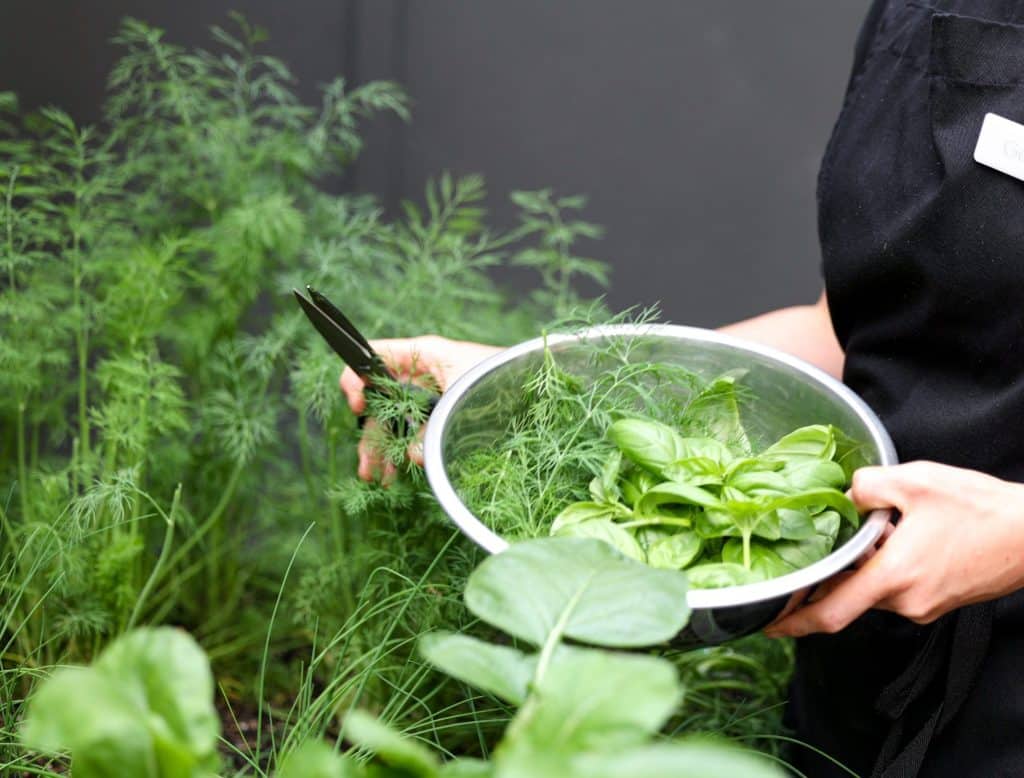Eating a colourful array of fresh fruits, vegetables and herbs enriches our body with the diverse nutrients it needs to thrive. Although you can quickly and easily stock up on your weekly groceries at the supermarket, planting your own garden of seasonal produce is a wonderful way to reap the benefits tenfold. From helping the environment to adding vibrant flavours to your home-cooked meals, to boosting your mental wellbeing, growing your own food can have a surprising range of advantages.
In this journal entry, we share some of the key benefits of starting a vegetable garden and provide a guide on how to get started.
5 benefits of planting your own produce
Why go to the effort of planting and cultivating a fruit and vegetable garden? There are so many benefits but for starters, home-grown produce is…
Richer in flavour
Home-grown produce is unmatched in flavour compared to what you can buy in stores. Part of this comes down to your ability to control when you pick your fruit and vegetables. There’s no way to tell how long ago store-bought produce was harvested – as soon as it’s picked the natural sugars begin turning to starch. With your own garden, you can pick your produce at peak ripeness and consume it straight away so you can enjoy the powerful natural flavours to the fullest.
Bursting with more nutrients
Mass-market produce prioritises shelf life over nutrient density and is therefore pumped with additives and sprayed with pesticides to prevent deterioration and perishing. Growing your own food garden allows you to cook with produce that is superior in terms of taste, that also contain higher nutritional value.

Therapeutic for the soul
Tending to your garden forces you to step away from your tasks, connect with nature, fill your lungs with fresh air and gives you a mental break. This connection to the food you eat can have a meditative effect that not only enhances the quality of food you feed your body but also boosts your mental wellbeing and clarity.
Reduce plastic usage
Fruits, vegetables and herbs sold in the supermarkets are often packaged in plastic – cellophane bags, plastic punnets, shrink wrapping – which poses a threat to the health of our planet. Growing your own fresh produce eliminates the unnecessary plastic usage – a plus for your body and the environment. Some studies have found that plastic wrapping can have a negative effect on health and wellbeing – so natural really is best.
Reduce food wastage
We often misjudge the amount of food we need, leading to the unfortunate task of clearing out the fridge of perished groceries week after week. Growing your own food solves this dilemma, as you only pick what you need when you want to eat it.
The easiest foods to start your garden
Despite these benefits, growing your own food does require time, patience and some love. If you’re new to it and aren’t sure of where to begin, here are some of the easiest foods to grow and look after:
Leafy greens
Lettuces, kale, rocket and more – there is a whole variety of leafy greens that you can grow easily from home. They often don’t require full sunlight and can even be grown in pots – making it a viable option for smaller spaces. These give you the perfect base for fresh salads you can add as a nutritious side dish to any meal.
Spring onions
Easy to plant and requiring sun or partial shade, spring onions are another fantastic option to have in your garden. Plus, you can harvest them by simply snipping what you need and leaving the roots planted, as they will continue to grow.
Strawberries
Deliciously sweet when plucked right from the plant, strawberries are a great option for beginners. With the right pot, quality soil and thorough watering, you’ll be adding vibrant and flavourful fresh strawberries to your fruit bowl in a couple of months.
Cherry tomatoes
With enough sun and care, cherry tomatoes are a wonderful option for an abundance of produce. Just be careful to not plant too many!
Perennial herbs
These are herbs that can be planted once and will grow back every year for a while. Sage, rosemary, mint, chives, parsley and thyme are a few perennial herbs commonly used in cooking that are bound to enhance the flavours of your cooking.

Click here to receive a free copy of our ebook, A Taste Of Eden, for 25 of our most-loved recipes for some inspiration for how you can cook wholesome, nourishing meals with your home-grown produce.
Tips for beginners
Before diving in, there are a number of considerations to take into account to make sure you’re setting up your vegetable garden for success.
- Location: Choose a space to grow your vegetables that is suitable for the plant to thrive.
- Season: Plan your garden around which fruits and vegetables are in season.
- Soil: Different plants require different types of soil to grow and flourish. Choosing the right soil is the key to success.
- Watering: Some plants need more watering than others – consider and plan this into your routine.
- Harvesting: Know when the perfect time is to pick your produce. Some may be left for longer and still remain ripe, whilst others are best harvested straight away.
Food is a core component of the healthful, rejuvenating experience our guests receive at Eden Health Retreat. Our chefs use fresh, seasonal, locally-sourced ingredients in our nourishing menu, as well as produce grown and picked from our very own soil. However, you can begin reaping the benefits from your own backyard – or balcony! No matter what space or conditions you’re living with, there are a number of ways you can begin growing your food from home and reaping the benefits.





